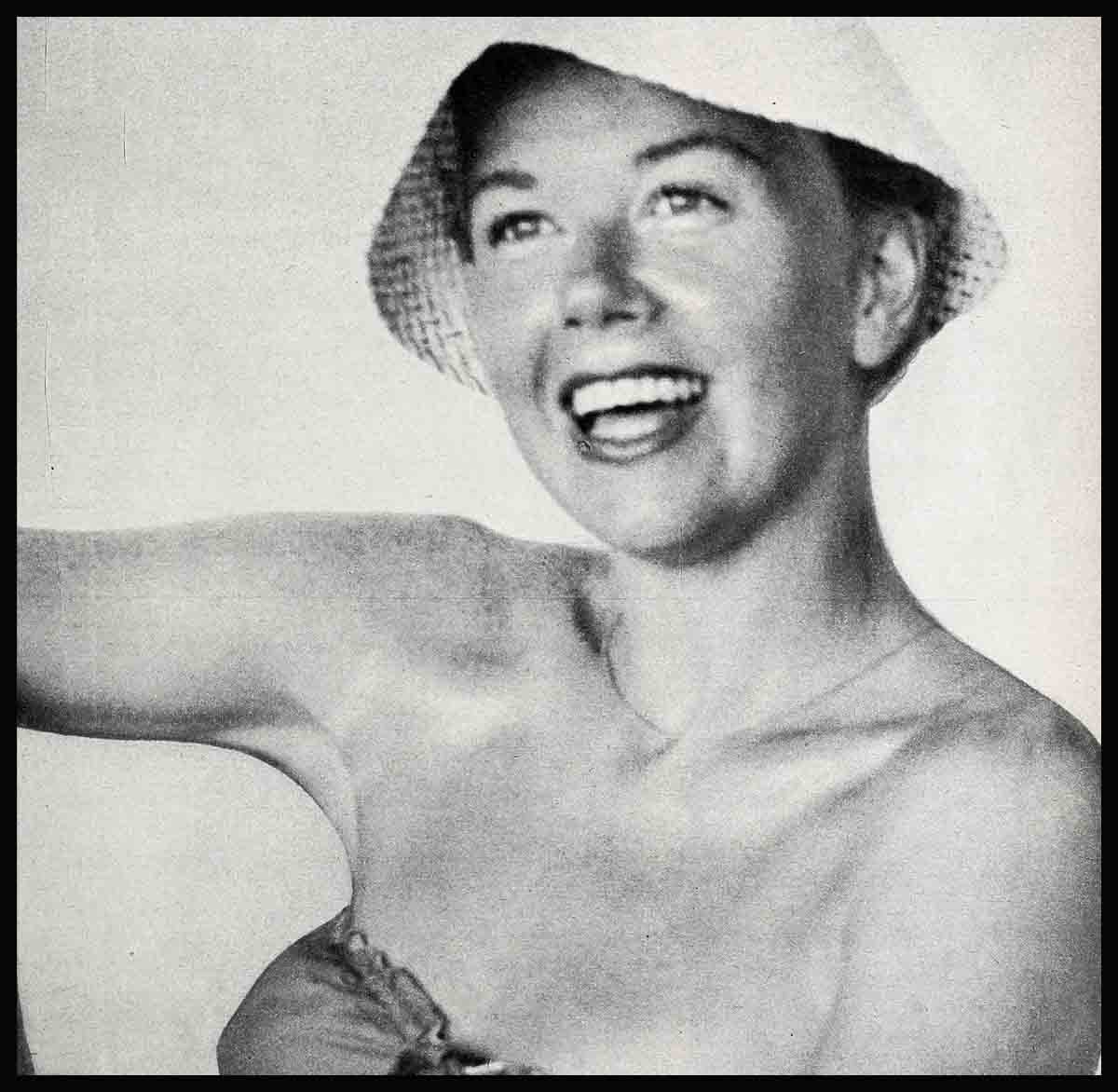
Whistle Bait—Doris Day
Those who know in Hollywood say that 1956 will be Doris Day’s year. This fact was confirmed the morning it was announced that she had been signed to star in M-G-M’s new musical version of “Anna Christie,” the Pulitzer Prize-winning play and former Garbo film. Musical or no, the role calls for an actress of great capability and sensitivity, and everyone is saying the new Doris Day will do that role full justice.
However, those in Hollywood who know even more say that—not just 1956—but every year is Doris Day’s year. For proof, they point to the record of her growth as an actress; to her emergence as one of Hollywood’s best-loved citizens; and to her unlimited faith in the future.
When Doris first stepped from a bandstand onto the Warner Brothers soundstages, her now-famed modesty about her ability undoubtedly stemmed from the fact that she was three years old when she first had a try at acting, and she could hardly have been considered a qualified judge of talent at the time. However, if she’d been another Sarah Bernhardt, she would have been sadly miscast in her first motion picture, “Romance on the High Seas.”
The script called for a pretty, peppy young girl who could trade quips with Jack Carson and put over a song or three. For good measure, Doris seemed so at ease on the screen you’d have thought she’d spent her life making movies. The critics liked what they saw, and it was Doris Day’s year. The following January, she officially began another—the year in which she solidly established herself as a star.

In one respect or another, since her arrival in Hollywood, each year has been an important one for Doris. Possibly because she’s not a girl for sitting on top of the world when she can stand—the better to view new horizons.
As proof that this is her year, there’s her M-G-M contract—one that any star would envy. There is also the busy office of Arwin Productions. This company was formed by Doris and her husband Marty Melcher to produce pictures, and they have one coming up, “Quality of Mercy,” that should be a real winner.
Most important, there is still another organization. Located on a quiet, neighborly street in the San Fernando Valley, it might be called Melcher, Melcher & Son. This one produces nothing but happiness for shareholders Doris, Marty and Terry—plus anyone else who happens to drop in. Officially, they have been in business for five years, as of April 3. On this day the Melchers celebrated their fifth wedding anniversary.
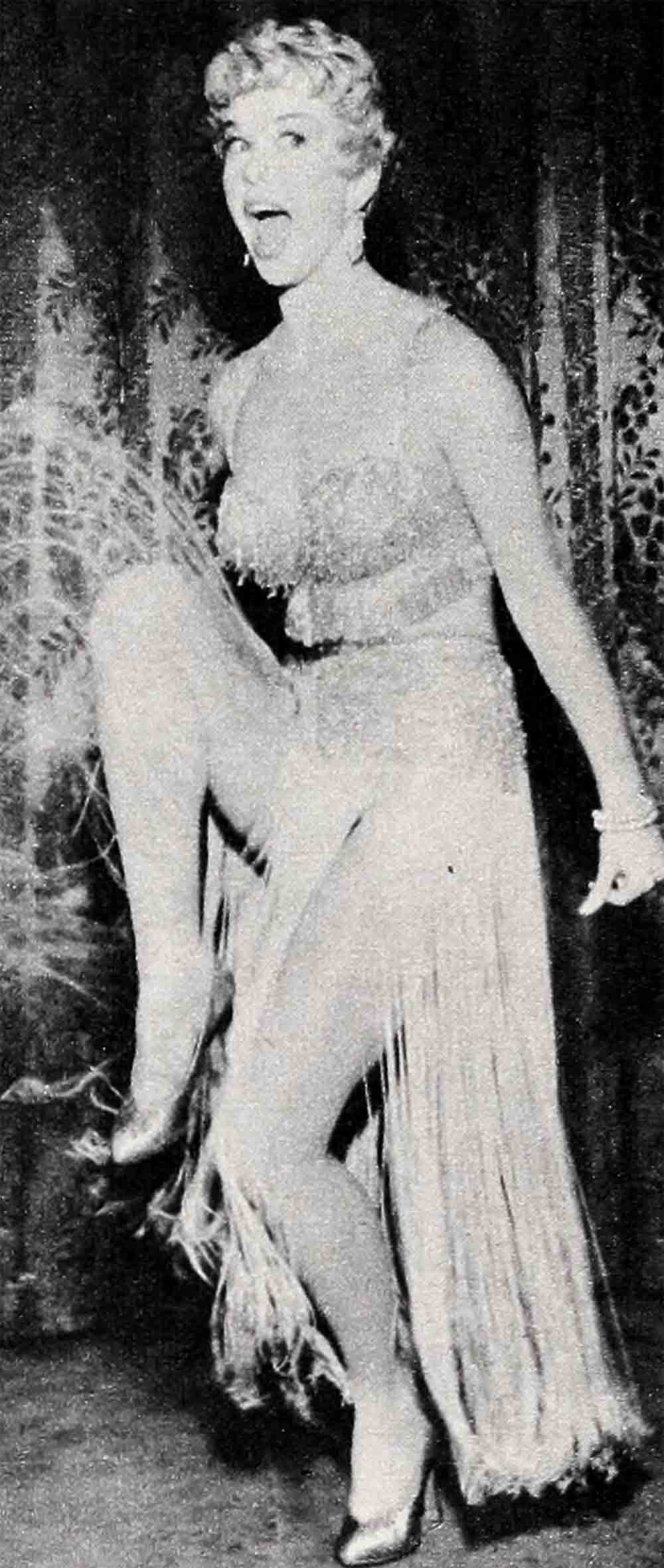
Throughout the rest of this year, you’ll be hearing a lot about the new Mrs. Melcher as well as the new Doris Day. In fact, at times you may think she arrived in a box which someone has just unwrapped—that is, if you believe those who vow that the changes occurred overnight.
Take the case of “Love Me or Leave Me.” At the beginning of one evening not so long ago, Doris was looked upon by the world at large as a musical-comedy queen. Later that same evening, after a lapse of the two hours it took to screen the picture, she was being hailed as a fine dramatic actress.
The suddenness of the discovery made it seem almost as if Doris had stepped off the Warner lot a sunbeam-like singer, then up and acquired ability of Academy Award caliber while driving across town to M-G-M. Just like that.
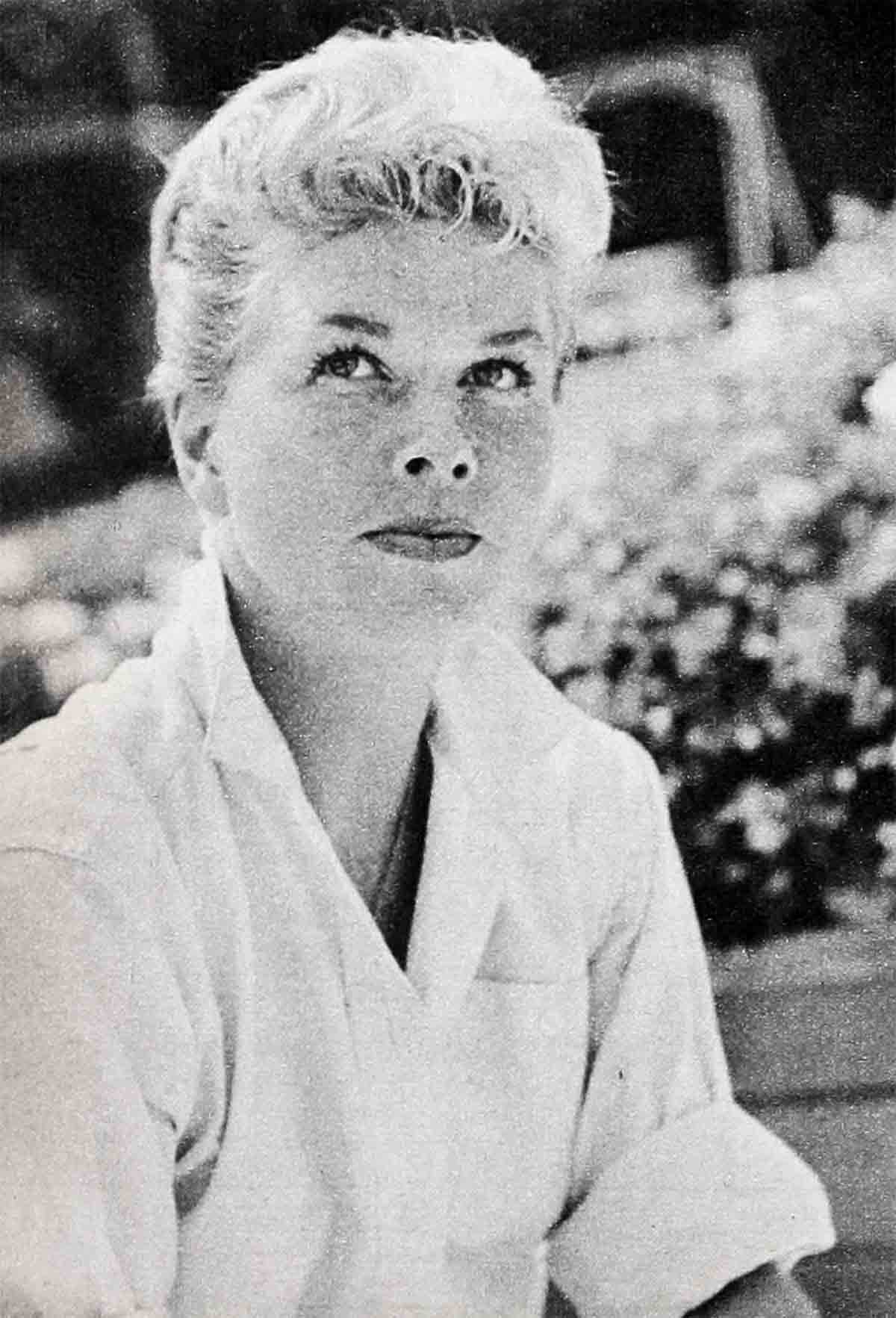
Actually, the ability had been there for quite some time. It was just that a script which afforded the opportunity to show it had been missing. “As Marty says, the timing was right,” Doris reflects. “When the picture came along, I was ready for it.”
In the future, there will be far fewer “On Moonlight Bay” parts for Doris. “I’ve always liked them,” she says, “but there comes a time when you just have to make a change. It’s the same as with records. If the trend’s toward rock ’n’ roll tunes, you do those—or ballads, or whatever. You do what the public wants.
“Picture-wise, as far as a personality is concerned, many people never see beyond what is on the screen. That’s only natural. But performers can get into a rut. For instance, everyone said for so long that I was the girl next door, but after a while the time came for me to change.”
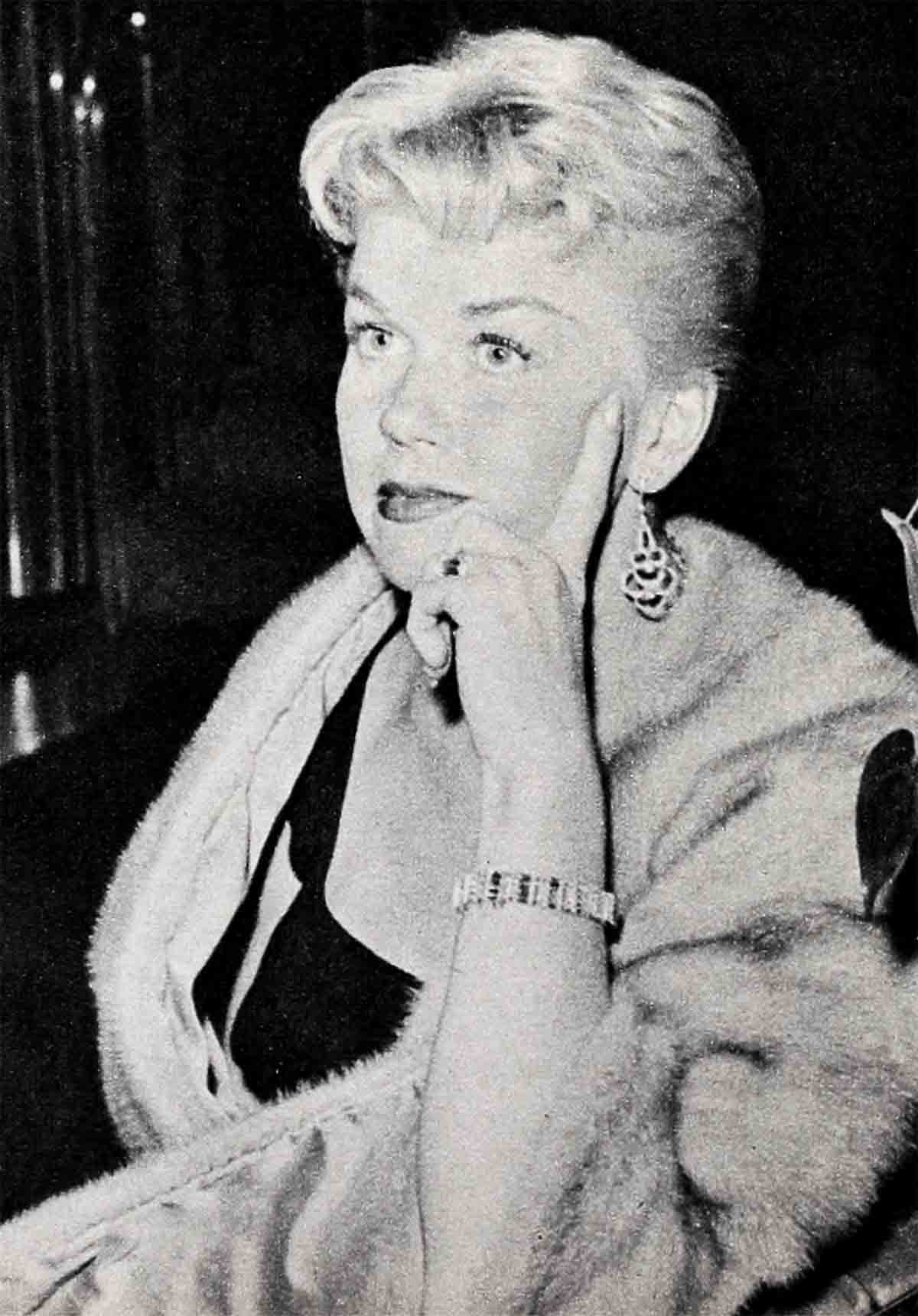
The changes carry over into Doris’ personal life, and she was ready for these, too. This year you’re going to hear about the Melchers’ new social life. How they’re stepping out quite frequently where once they couldn’t be pried from the family fireside. You’ll hear that Doris has completely redecorated her home, that she’s mulling the thought of moving from the comfortable neighborhood in which she has lived since she became a star. And you may wonder exactly what has happened to Doris Day.
Simply this: she has added new dimensions to her life. The resultant changes have come quite naturally as a part of happy, progressive living—although some of them have startled folks a bit.
For example, if you were Doris’ dressmaker, you might have come close to swallowing your straight pins the day she dropped by to talk over new designs. “Yes, I know what you want—collars up to here,” said the dressmaker, pointing to her chin.
Miss Day’s own chin tilted a bit. “Not this time,” she replied firmly. “I believe I can wear scooped and low-cut necklines as well as anyone else. And I’m tired of always wearing the same thing.”
She got what she wanted. “It’s nice to get away from Peter Pan collars,” Doris grins. “And I really don’t think that ‘Love Me or Leave Me’ had anything to do with my decision. I just wanted more variety in my wardrobe.”
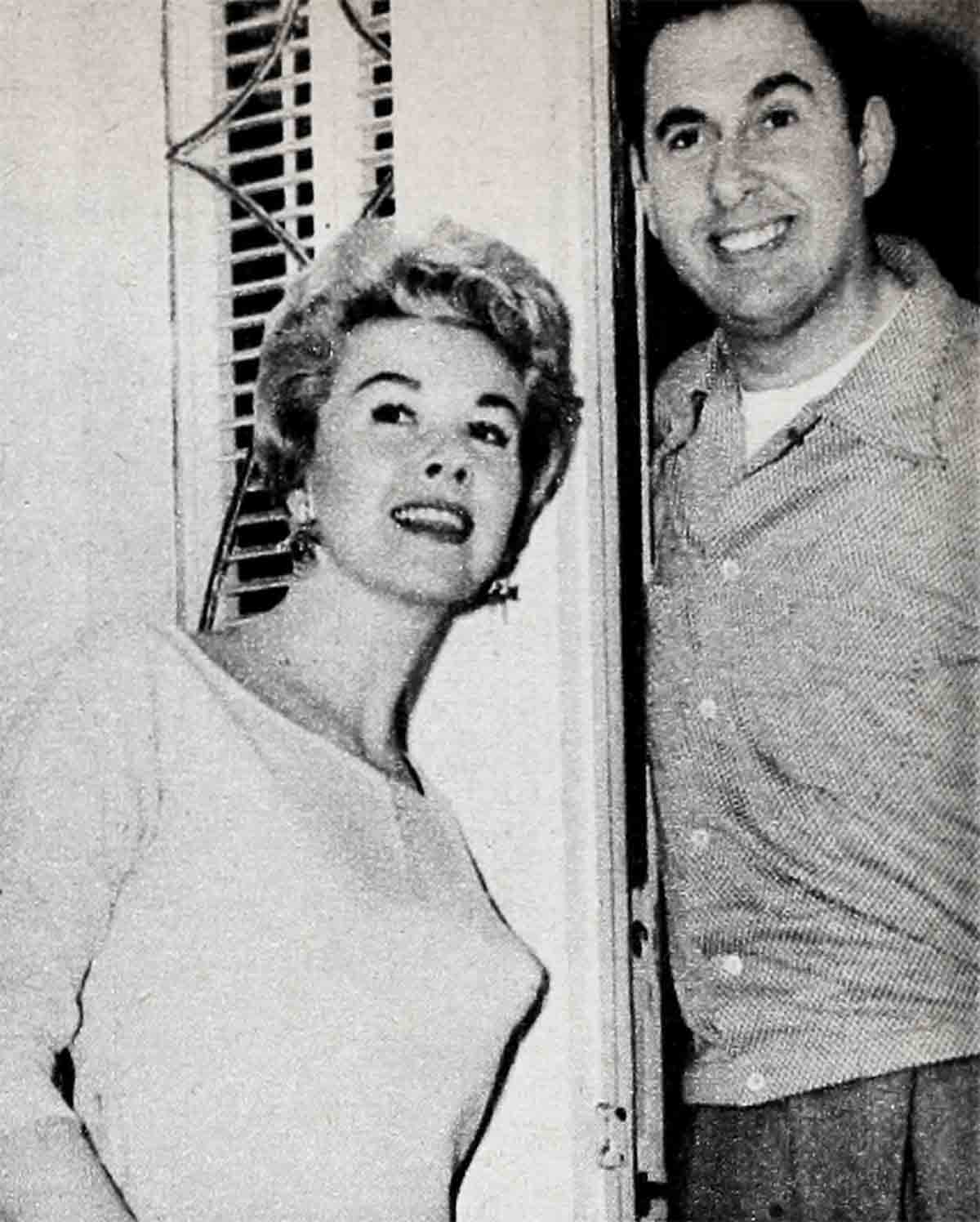
This is highly possible, but not so probable. The first morning Doris walked onto the set wearing a figure-hugging, down-to-there gown—well, she didn’t walk. To say she crept would be more like it—as if maybe no one would notice. She admits that she was downright embarrassed, in the absence of her usual turtle-necked outfit. However, she spent the day good-naturedly taking the whistles in her stride. “By the second day of shooting,” she laughs, “I loved every minute of it!”
If you were a guest at a recent dinner party, you might have found yourself settling down for home movies following the meal. You would have heard the hostess—a beauty famed for her figure—explaining the film she was about to show: shots taken on her recent visit to the French Riviera. “I’m not the Bikini bathing suit type,” she remarked. “But now you’re going to see someone who is.”
You might have gasped in surprise, as the others there did. There was Doris, in a Bikini, looking for all the world like a pinup picture. “Here in Hollywood I wear mine only in our back yard,” Doris will hastily tell you. “I like them. They’re comfortable. But I’d never wear one on the beach, unless I were in Europe. Over there, no one cares what you have on. Why, they don’t give a Bikini a second look!”
Don’t let the rumors fool you. Doris has kept the qualities for which she became famous. Unknowingly, she proves the fact every day. For instance, if you were a writer who had heard the tales of the new Doris Day, you might have expected her to meet you for a luncheon interview looking like a Vogue cover girl—with possibly a layer or so of pancake on her face to hide her unsophisticated freckles. At which luncheon she would have crossed you up by appearing in a sweater and skirt, looking like any college co-ed.
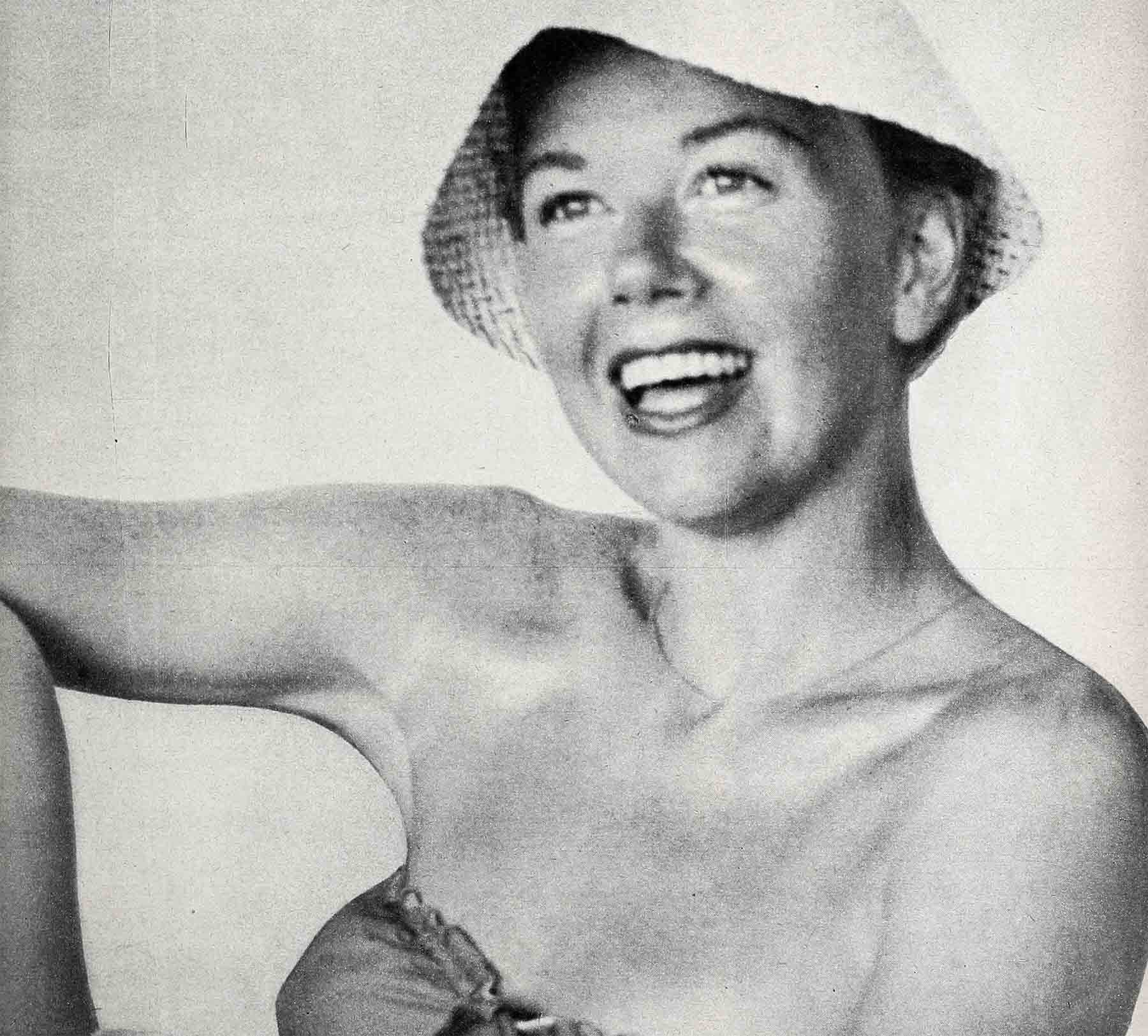
Doris Day is in “Julie” and “The Man Who Knew Too Much”
You might also have expected fans to fall at her feet—as in the olden days of super-glamour—or waited for the curious stares of the awed. And indeed as you left the restaurant, two ladies approached. For autographs? Well, no. They were visiting from Cleveland and wanted to know where to find Bullock’s department store. Doris and a friend gave detailed directions and, as the ladies walked away, you heard them murmur, “My aren’t these Californians friendly!”
If you were in the parking lot at Paramount a short time ago, you might have seen a Cadillac pull up and overheard the driver request, “Will you tell Mr. So-and-So I’m here?”
“Big star,” you might have concluded. “Can’t get out of the car and walk into the building.” However, closer scrutiny would have revealed that the big star and her chum were completely covered with crumbs and powdered sugar from the doughnuts they were munching.
When the studio man arrived, she produced a package. “Have some,” she offered. And then with the amazement of a child who’s found more birthday presents than she can open, “Would you believe it, each one’s different! We brought coffee, too!”
But still, Doris insists her tastes have changed a lot in every way—if not in doughnuts. “Take the house,” she says. “I remember once I remarked to Marty that I thought I’d go into the interior decoration business. He just laughed and said that if someone ever wanted a modern house I’d walk right out on them.
“I used to hate the idea. I loved Early American, which I had first. Then I went in for French Provincial. But now I’ve come to see the beauty in modern. And that’s what I’m going to have next—that is, if Marty likes the idea, too. We like doing everything together.
“There’s the matter of color, too. We used to have dark green walls, and there was a big red couch in the living room that practically leaped out at you.
“I decided that after all the noise on the set all day, I wanted a quiet house, and so did Marty. So that when we came home we could flop on the couch and relax. Now we have muted shades—buttercream walls, carpeting, couches, with touches of color here and there. It’s so warm and peaceful-looking. And so easy to live with.”
As for the subject of moving, the idea is nothing new, nor is it a desire to be “exclusive.” Doris has always longed to live high above the city. She loves a view. When she and Marty visit their friends who have hilltop homes, she invariably disappears from the group for a while. Hostesses know exactly where to find her—at the window with the best view, or perhaps on the terrace, trying to figure which street is where from the patterns of tiny lights below.
“I’m going to start looking for a new house soon,” she vows. “As I figure it, it will take at least two years to find what I want. We won’t move right away, though. ‘m sentimental about our present neighborhood, and it’s great for Terry because all of his friends are there.
“The people we know who live on hilltops have to drive their children around to play with their friends. That wouldn’t do for us just now. When Terry comes home from school, he throws down his books and runs out and all the kids are right there. They come over and play badminton and volleyball and swim. We like it that way. When he’s older, homework will keep him busier in the evenings and maybe then we’ll take to the hills.”
Next time she moves, Doris will have the strong arm of Marty Melcher to help her. And aside from furniture, they’ll take a van load of memories with them. Their courtship was centered around the San Fernando Valley house. It was their mutual respect for home and family life that drew them together. That, and love, of course. But love came later.
Neither of them can tell you when they fell in love. “It just happened,” they say. And since Marty was such a handyman around the house, after their wedding Doris laughed, “Sometimes I think he got the idea of marrying me out of a Sears-Roebuck catalog!”
When, and if, they move, they’ll ignore the mansions offered. “If we can’t have a house that can be run by one person, we don’t want it,” says Doris.
At home, Doris is a throw-awayer, Marty is a saver. “He’ll save a little nail, a piece of wood, a piece of glass—anything,” she laughs.
“What are you going to use it for?” asks the lady.
Her husband smiles a wise smile. “You never know,” he tells her. She gives him about three months and, if it hasn’t been used, out it goes.
“What do I save?” Her eyes widen.
“Why hardly anything—except tissue paper. When anything comes in a box, I take out the tissue paper and put it in the closet. But you know it’s wonderful for packing. Clothes don’t rumple as easily.”
Speaking of the subject of packing, their trip to Europe floored one and all—at least all who believed that the Melchers would have to be dynamited out of their back yard except for a trip now and then to see America first. “But I’m positive Doris would never have gone to Europe if Terry hadn’t been on summer vacation and Marty couldn’t have taken time off from his work,” says a friend. “Before anything else, she’s a wife and mother. Everything she does revolves around her family.”
The story that the Melchers are stepping out socially more often is true. Nowadays they may be seen attending a good many industry affairs. And they frequently attend small dinner parties and entertain at home. “Our friends seem to love to sit around and talk in our pink playroom,” says Doris. And when the weather’s right, they have all the facilities for back-yard games, swimming and outdoor eating.
The Melchers seem to have everything. “It’s a wonderful marriage,” says a friend. “And do they ever make the experts appear to be idiots! You know, the people who say that a husband and wife shouldn’t work too closely together in this industry, or that stars’ husbands are overshadowed by their wives’ fame?
“Marty’s overshadowed by no one. The more success Doris achieves, the better he likes it. He’s so darned proud of her. He’s guided her career to the heights, taught her to enjoy her success, brought her out of her shyness. She’s one of the friendliest stars in the business.”
It’s true. Take the word of another Hollywood citizen. “In this town,” he says, “you may meet a star at a party or around someplace, but you never know whether or not to say hello next time you run into them. I’ve tried—and found myself staring into a pair of blank eyes.
“I met Doris officially just once, a long time ago. I’ve run into her a number of times since. She’s never failed to smile—first, mind you—and give me a big hello. I don’t know whether she knows me from Adam and there’s no reason for her to remember me, but it’s certainly a nice feeling to be on the receiving end of one of those grins of hers.”
Marty, though more reserved, is equally as friendly. You’ll find that happy people always are, somehow.
Doris and Marty treasure their life together and their happiness as some people treasure their gem collections. Little wonder that every year is her year—correction please—their year.
THE END
It is a quote. PHOTOPLAY MAGAZINE MAY 1956



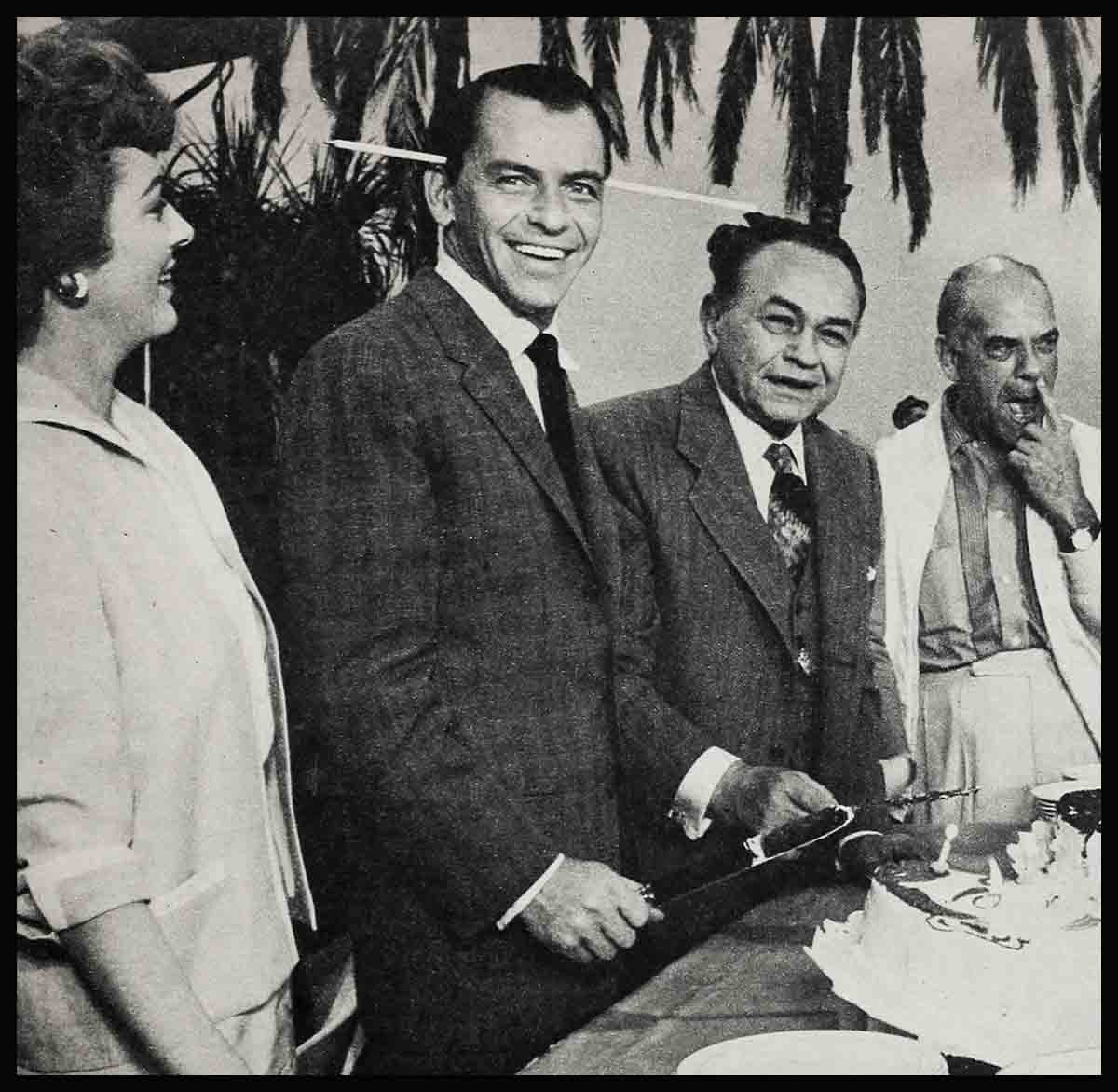

vorbelutr ioperbir
6 Temmuz 2023I haven’t checked in here for a while because I thought it was getting boring, but the last few posts are great quality so I guess I’ll add you back to my everyday bloglist. You deserve it my friend 🙂